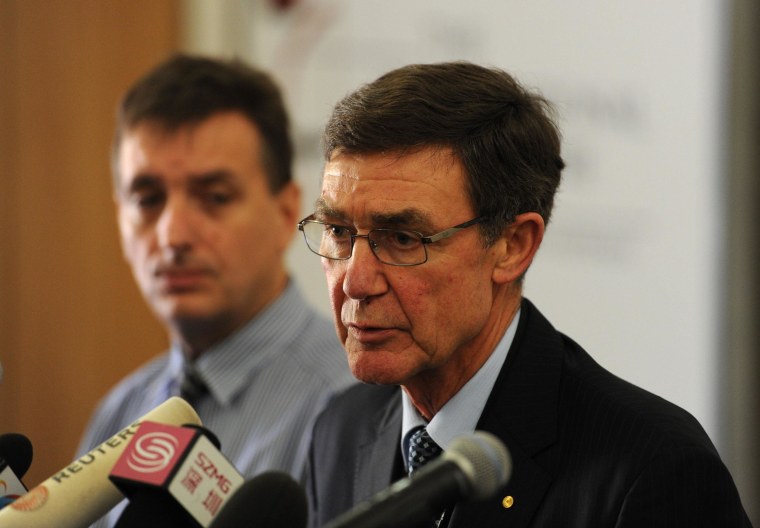PERTH, Australia - The hunt for missing Flight MH370 could “drag on for a long time” and even the new search zone may have to be reviewed, officials said Tuesday in the gloomiest assessment to date of task ahead.
“This search and recovery operation is probably the most challenging one I've ever seen,” said Angus Houston, head of the joint Australian agency now coordinating the multinational search effort.
Houston promised the daunting search effort would continue “with much vigor,” but he repeatedly emphasized the size of the task and downplayed the usefulness of the radar and satellite data compiled by Malaysian investigators.
"Essentially we do not have any precision in where the aircraft entered the water"
“Inevitably if we don't find wreckage on the surface we are eventually going to have to - probably in consultation with everyone who has a stake in this - review what we do next,” he told reporters in Perth. “It will take time. Not something that's necessarily going to be resolved in the next two weeks for example.”
He said recent estimates on the probable speed and altitude of the missing plane, calculated using radar and satellite data were “a very inexact science” – suggesting the search zone may change again as new information comes to light. On Friday, the area was moved almost 700 miles northwards based on revised estimates of where the plane might have crashed into the sea.
“The search area is based on the best info available to us,” Houston said. “Essentially we do not have any precision in where the aircraft entered the water and that's why, if we can find a piece of wreckage, we will then be able to narrow the search."
He added: “A lot of experts around the world are doing computer modeling to try and determine where it might have ended up. An aircraft has a very small fuel burn at high altitude so if it was flying at 40,000 feet, it would go a long way. We don't know what altitude the aircraft was travelling at. We don't know what speed it was going at.”

That pessimistic analysis was echoed by Australian Maritime Safety Authority’s deputy chief executive officer Mick Kinley, who said satellite data from the new, revised search area had not yielded any more clues in the investigation.
“We have not heard any satellite data [from the new area] that has given anything better than low confidence of finding anything so far,” he said.
Ten planes and nine ships were involved in Tuesday’s search for the Malaysia Airlines Boeing 777, with weather in the zone described as poor, with areas of low visibility.
More equipment will join the effort in the coming days. The Australian ship Ocean Shield has set sail for the zone, towing a U.S. Navy "pinger locator" that will listen for signals from MH370’s black box. It is expected to arrive on Thursday.
Australia will also deploy a modified Boeing 737 to act as a flying air traffic controller over the southern Indian Ocean to prevent a mid-air collision among the aircraft involved in the search. The E-7A Wedgetail, fitted with advanced radar, will be deployed "in the near future," Houston told reporters.
The Malaysia Airlines Boeing 777 vanished March 8 with 239 people on board after leaving Kuala Lumpur bound for Beijing.
Malaysia has been criticized for its handling of the search, particularly its communications to the media and families of the passengers.
In a move likely to fuel those concerns, the government changed its account of the final voice transmission from the cockpit. In a statement late Monday, it said the final words received by ground controllers at 1:19 a.m. on March 8 were "Good night Malaysian three-seven-zero." Earlier the government said the final words were "All right, good night." The statement didn't explain the discrepancy.
Alastair Jamieson reported from London. Rebekah Smyth contributed to this report.